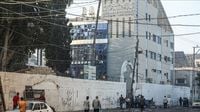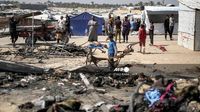The International Court of Justice (ICJ) has granted Israel a six-month extension to respond to allegations of war crimes and genocide filed by South Africa. This decision was made on April 14, 2025, allowing Israel's defense team until January 12, 2026, to formulate their response to the claims.
Originally, Israel was required to present evidence in its defense by July 28, 2025. The lawsuit, initiated by South Africa on December 29, 2023, accuses Israel of violating the Convention on the Prevention and Punishment of the Crime of Genocide due to its actions in the Gaza Strip.
In a related development, Nicaragua, which had previously withdrawn from the case citing high costs and resource constraints, announced on April 15, 2025, that it held meetings in Palestine to resume its intervention in this legal battle. However, as of April 18, the ICJ had not officially confirmed Nicaragua's re-entry into the proceedings.
Rosario Murillo, the spokesperson for the Nicaraguan government, claimed to have received a communication from Palestinian Prime Minister Mohammad Mustafa expressing support for Nicaragua's renewed interest in the case. This announcement came after Nicaragua had stated on April 1 that it would step back from the case due to financial concerns.
Legal experts suggest that until the ICJ officially acknowledges Nicaragua's participation, the country cannot engage in the case. If the court had accepted Nicaragua's involvement before its withdrawal, the legal ramifications could complicate its reapplication.
Meanwhile, Israel is expected to present its counter-memorial by July 28, 2025, while other countries, including Mexico, Cuba, Libya, Turkey, Chile, and Colombia, remain involved in the case.
In a broader context, South Africa has been vocal in its condemnation of Israel's military actions in Gaza, particularly following a missile strike on the Al-Ahli Arab hospital on April 13, 2025. This attack is part of a larger pattern, with reports indicating that Israel has bombed, burned, and destroyed at least 35 hospitals in Gaza since the onset of the conflict in October 2023.
South Africa's Department of International Relations and Cooperation (Dirco) stated, "South Africa joins the global condemnation of the bombing, which constitutes a blatant violation of international humanitarian law." The statement highlighted that attacks on healthcare facilities, medical personnel, and patients are classified as war crimes under the Fourth Geneva Convention of 1949.
Recently, Israeli forces were also reported to have caused the deaths of 15 humanitarian workers in Gaza, including eight from the Palestine Red Crescent Society, one from the United Nations Relief and Works Agency (UNRWA), and six members of the Palestinian Civil Defense. Dirco emphasized that such deliberate attacks against medical and humanitarian personnel are prohibited by international law.
Adding to the urgency of the situation, South Africa expressed grave concern that Israel has halted all humanitarian aid to Gaza since March 2025. This action contradicts the ICJ's binding provisional orders, which mandated Israel to ensure the flow of humanitarian assistance to the affected region.
In the context of Nicaragua's legal battles, the Nicaraguan government has two active cases at the ICJ: the intervention in the South Africa vs. Israel case and a separate lawsuit against Germany. Nicaragua's case against Germany was filed on March 1, 2024, accusing the country of violating obligations related to the prevention and punishment of genocide.
The Nicaraguan General Budget for 2025 allocates 81.36 million cordobas (approximately $2.21 million) for the presentation of various documents to the ICJ, including interventions and follow-ups on previous rulings. Nicaragua's memorial in the case against Germany is due on July 21, 2025, with Germany required to submit its counter-memorial by July 21, 2026.
Despite the complexities surrounding Nicaragua's legal strategies, experts caution that the case against Germany is politically charged, and the regime may be unsure of its chances of success. The primary goal appears to be projecting a favorable image in the international arena while simulating a defense of human rights.
However, the ICJ's cautious approach, especially in politically sensitive cases, raises questions about the viability of Nicaragua's claims. The court previously denied Nicaragua's request for provisional measures to compel Germany to cease arms supplies to Israel, a decision that does not preclude the possibility of a favorable outcome in the future.
As the legal proceedings unfold, the ICJ's decisions will be closely monitored, with potential ramifications for international relations and humanitarian efforts in Gaza. The next steps include Israel's counter-memorial and the ongoing deliberations regarding Nicaragua's participation in the case.






